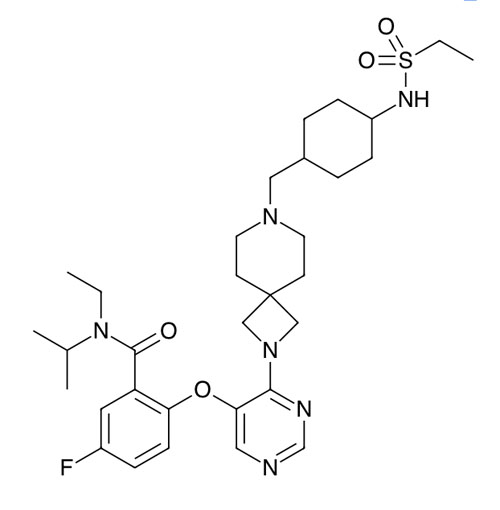The prognosis is a poor, with a median overall survival of less than 1 year after standard of care first-line treatment, including intensive chemotherapy and stem cell transplantation.
Most suffer a relapse within 5 years and fewer than 5% of patients achieve complete remission with third-line or subsequent treatment. The disease can phenotypically appear as acute myeloid leukaemia and there are no specifically approved therapeutics for this condition.

The KMT2Ar genes produce fusion proteins that drive leukaemic cancer growth if they interact with the protein menin. Disrupting this interaction has been shown to arrest the growth of KMT2Ar leukaemic cells.
A selective small molecule inhibitor of the menin-KMT2A binding interaction, revumenib, is now being developed by Syndax Pharmaceuticals as a potential treatment for KMT2Ar leukaemia.
A first-in-human trial showed that it had potential in KMT2Ar leukaemia, with a low incidence of grade 3 or higher treatment-related adverse events. Initial analysis showed a 30% rate of complete remission either with or without partial haematologic recovery (CR/CRh).1
Updated data have also been released for this Phase I part of a Phase I/II trial; patients with relapsed or recurrent KMT2Ar leukaemia were enrolled in six dose escalation cohorts to identify the recommended Phase II dose.2
About a third of the patients had undergone at least four prior lines of therapy and nearly half had had a stem cell transplant. There was a CR/CRh rate of 37.3% and an objective response rate of 68.6%.
The response rates were consistent for paediatric patients with a CR/CRh rate of 20% and an overall response rate of 66.8%.
In the Phase II part of the trial, done in both adults and children, revumenib was given orally every 12 hours in 28 day cycles at the recommended Phase II dose (along with a strong cytochrome P450 3A4 inhibitor) of 163 mg (or 95 mg/m2 if the body weight was below 40 kg).3
At the data cut-off point, 94 patients had received at least one dose of the drug, 23 of whom were younger than 18. Among the 57 patients evaluable for efficacy (13 of whom were children), a total of 13 achieved CR/CRh at a rate of 23% for both adult and paediatric patients.
The median time to CR/CRh was 1.9 months with a median duration of 6.4 months. The overall response rate in these patients was 63%, with 36 patients achieving a response.
Responses were seen in all major subgroups, including those with prior treatment and/or prior stem cell transplant status. The median overall survival at the time of data cut-off was 8 months. Trials continue.
References
- G. Issa, et al., Nature 615, 920 (2023).
- I. Aldoss, et al., ASH Annual Meeting and Exposition 2023 (San Diego, CA, US, 9-12 December), Abstr. 2907.
- C.M. Zwaan, et al., Pediatr. Blood Cancer 71(Suppl. 2), Abstr. 2002 (2024).
